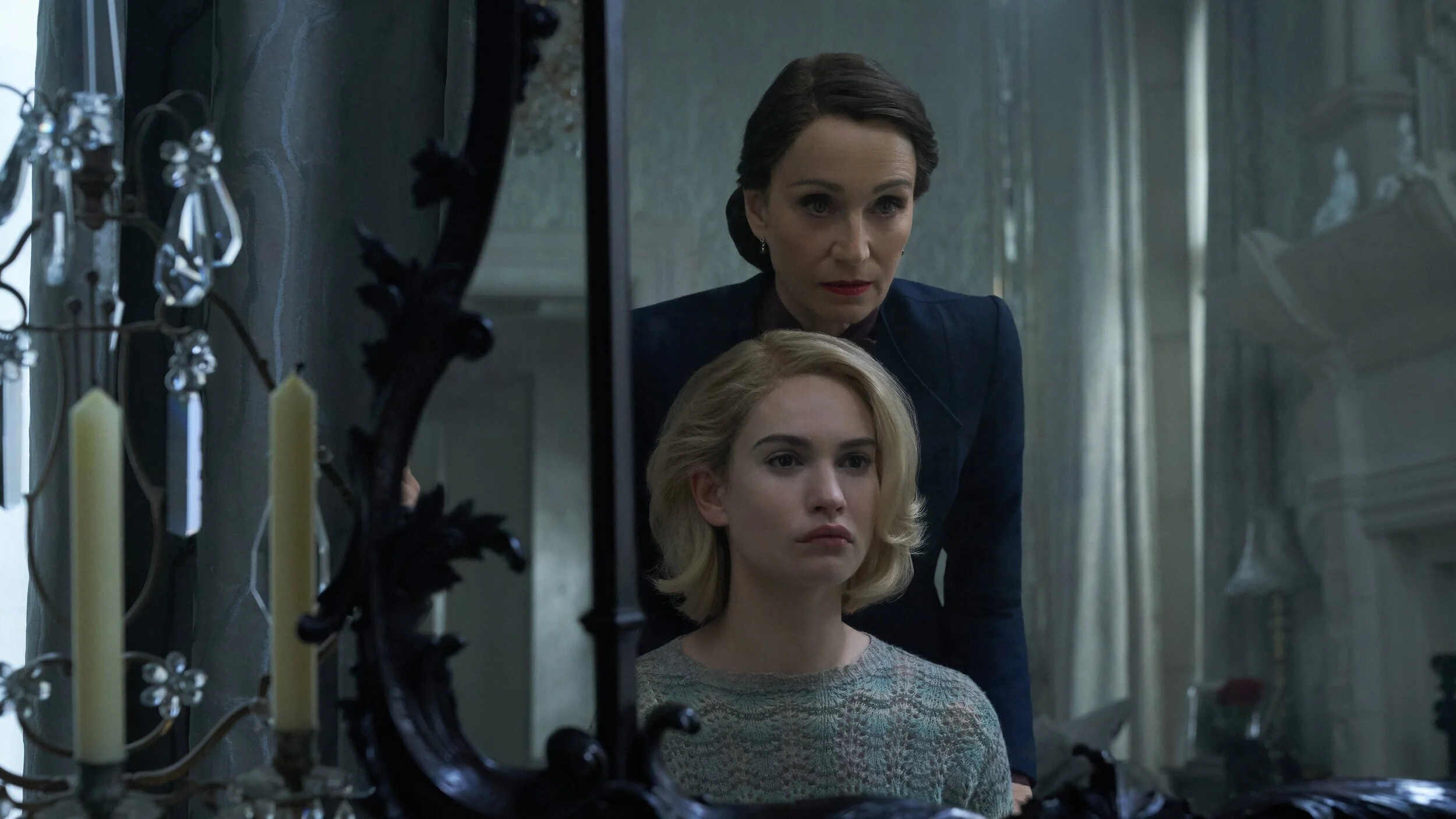Rebecca
A new treatment of a familiar story which for many is bound to prompt comparisons.
Lily James and Kristin Scott Thomas
The film version of Daphne du Maurier's celebrated novel Rebecca made by Alfred Hitchcock in 1940 is not quite perfect but it comes very close to being so. In some ways that is surprising because, although the tale is not without a corpse and an investigation, it is first and foremost a love story of a kind that links it with an earlier classic, Charlotte Bronte's Jane Eyre. That meant that Rebecca had a character different from any other Hitchcock film but he nailed its requirements aided by Franz Waxman's splendid music score which captured its tone perfectly and by wonderfully precise and flawless casting.
This new film version is directed by Ben Wheatley, a distinctive young filmmaker of today, and he too is making a work which is of a kind that matches nothing else in his output. But, unlike Hitchcock, there is no sense that he has absorbed what Rebecca needs to be. I had heard claims that his treatment was more rooted in the original novel and was not to be regarded as an attempt to remake the 1940 movie but the story remains the same to such an extent that a comparison with Hitchcock is inevitable. There are a few points at which the two films diverge but only very few until we reach the last stretch when the heroine is given more to do and when a death occurs not in the way that it did before. Unfortunately, these changes, including also some extra planned tension in a scene in London that fails because it lacks conviction, prove to be the weakest scenes in Wheatley's film.
However, one must remember that some viewers will be unacquainted with the Hitchcock and may even be quite unfamiliar with du Maurier's tale of a timid paid companion (Lily James) who, while in Monte Carlo, encounters a wealthy widower, Maxim de Winter (Armie Hammer), and is quickly wooed and taken back to England as his bride to live in his ancestral home, the great house known as Manderley. Once there her insecurity deepens. She is unused to such grand surroundings and, furthermore, the formidable housekeeper, Mrs Danvers (Kristin Scott Thomas), who had been devoted to Max's first wife, the late Rebecca, ensures that the presence of the dead woman continues to be felt. Later the circumstances of Rebecca's death and the true nature of her character will become key matters, but until then the focus is on an inexperienced young woman who finds herself having to fill the shoes of somebody described as the most beautiful woman ever seen and known as an assured hostess at ease in Manderley in a way that her successor can scarcely hope to be. For female readers and for female viewers of Hitchcock's film identifying with a young woman in love who feels inferior and yet ultimately triumphs against the odds is the essence of what makes Rebecca so appealing.
The one failure in the original film lies in making its heroine just that bit too clumsy and gauche even though Max will at one stage refer to her funny, young, lost look as being central to what attracted him. For modern audiences the writers of the new screenplay have given the heroine much more strength but in doing so have lost that look of hers despite the fact that Max's comment is retained in the dialogue. Even if the earlier screenplay overdid it, Joan Fontaine convincingly expressed these particular aspects of the character whereas here Lily James, competent enough, is just a standard leading lady. Even more so, Armie Hammer's Max lacks the individuality and the sense of hidden depths that Laurence Olivier brought to the role. But that kind of comparison can be made all the way down the list of supporting characters (for example, Sam Riley as Rebecca's cousin plays well enough but cannot match the impact of the more caddish interpretation by George Sanders). The most successful casting here is that of Kristin Scott Thomas but even she can't match the original. That's hardly to be expected since Judith Anderson's Mrs Danvers has become iconic, but in any case Ben Wheatley does not help her. Perhaps because of the early scenes in Monte Carlo and the later coastal shots in Britain, Wheatley has opted to have the film shot in the 'Scope format but the very limited use of close-ups and the sense of empty space take away the intimacy and thus the impact and that results in reducing the power of Mrs Danvers. Nor is it helpful that Wheatley has a fondness for pointless intercutting including several instances where one scene continues mingled with another one slightly later on in the time scale.
This remake is not a disaster so it is easy to believe that newcomers to the material will find it acceptable fare. Nevertheless, it never displays the clear sense of character and purpose that any truly memorable film requires. Even at its best it is all rather anonymous and forgettable, a fact that is underlined for those with comparisons to make because Hitchcock's Rebecca is indelible.
MANSEL STIMPSON
Cast: Lily James, Armie Hammer, Kristin Scott Thomas, Keeley Hawes, Ann Dowd, Sam Riley, Tom Goodman-Hill, Mark Lewis Jones, John Hollingworth, Bill Paterson, Ben Crompton, Jane Lapotaire, Lucy Russell, Jeff Rawle, Ashleigh Reynolds, Bryony Miller, Julia Deakin, David Horovitch.
Dir Ben Wheatley, Pro Tim Bevan and Eric Fellner, Screenplay Jane Goldman, Joe Shrapnel and Anna Waterhouse, from the novel by Daphne du Maurier, Ph Laurie Rose, Pro Des Sarah Greenwood, Ed Jonathan Amos, Music Clint Mansell, Costumes Julian Day, Dialect coaches Jill McCullough and Jessica Hammett.
Netflix/Working Title Films-Netflix.
122 mins. UK 2020. Rel: 16 October 2020. Available in cinemas and on Netflix. Cert. 12A.


